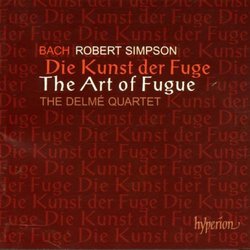Bach's "Art" at a Higher Pitch
Thomas F. Bertonneau | Oswego, NY United States | 11/16/2000
(5 out of 5 stars)
"Bach's "Art of the Fugue," forgotten after his death and rediscovered only in the nineteenth century, has exerted a powerful fascination on twentieth century composers; indeed, arranging Bach's score-without-instrumentation for greater or lesser forces has constituted a musical cottage-industry, with realizations for chamber orchestra, mixed endemble, brass ensemble, string quartet, and even saxophone quartet appearing in the catalogues and on record. In fairly recent times, the Juilliard String Quartet and the Keller Quartet have committed their renditions to compact disc (Sony and EMC respectively). Along comes yet another string quartet version of "The Art," this time as arranged by the late Robert Simpson (1921-1996) for performance by the Delmé Quartet. Simpson's thoughts about "The Art" deserve close attention, closer perhaps than others, because, as a composer himself of symphonies and string quartets he has shown himself to have deeply assimilated Bach's contrapuntal ethos. Two of Simpson's masterpieces, the Ninth Symphony (1987) and the Ninth String Quartet (1982), exploit the full compass of Bachian polyphonic science, the Quartet in particular constituting all by itself Simpson's very own "ars combinandi tema contra tema." (It consists of thirty-two palindromic variations and a palindromic fugue on a palindromic theme taken from Haydn!) But it would be hard to find a Simpson score, especially among the fifteen string quartets, that did not rigorously exploit fugal and canonic possibilities. In a sense then, in setting his hand to Bach's uninstrumented masterpiece, Simpson simply gives back what he has already taken and internalized and exploited. The Delmé players deserve the honor of presenting the result as they have premièred many of Simpson's essays in the string quartet genre. (And have recorded them for Hyperion.) How does Simpson's arrangement differ, say, from that of the Keller Quartet and what distinguishes the Delmé Quartet's playing from that of other similar ensembles in the same piece? Simpson regards the four canons as anomalous in the context of the fugues - as anticipations, rather, of a follow-on "Art of the Canon" - and so he discards them. He also notes that the scoring of Bach's D-Minor essay exceeds the range of a standard string quartet, so he solves the problem (let purists squirm) by transcribing the work into G-Minor. To ice the cake of his audacity, Simpson adopts Sir Donald Tovey's completion of the finale fugue. This is not one of those performances of "The Art" where the music simply breaks off. We have, as a result, a highly logical sequence of increasingly complex and fascinating fugues on the Ur-Thema and its transformations for a homogeneous medium nevertheless capable of individuating the four voices required by Bach's conception. The Delmé Quartet plays with standard modern vibrato, unlike the Keller Quartet, and in defiance of the current "correct" style for eighteenth century music. To which one wants to say "Gott sei Dank!" Thus the first few measures of Contrapunctus I suggest, in their passion and richness of sound, Beethoven almost as much as Bach. The other fugues confirm the impression. The Delmé produces, in addition, an astonishing range of superbly recorded color (kudos to the Hyperion engineers) which transcends the medium. I will assuredly return to this disc again and again."
The Best of the Quartet Versions
Stephen Grabow | Lawrence, Kansas | 05/13/2008
(5 out of 5 stars)
"I am familiar with the Julliard Qt. performance and recently bought the Emerson Qt. CD on Deutsche Grammofon -- which I quite like -- but now that I have the Delme Qt. recording I realize that the Emersons are, as one reviewer put it, too romantic. This performance by the Delme Qt. is so elegant and carefully constructed that one is constanly aware of the "long line" (which I confess I had forgot about with the Emersons because they are so much more emotional, although the Delme play with great feeling). The Delme recording is simply more beautiful."
Dense but infinitely rewarding
Stephen Grabow | 01/24/2003
(4 out of 5 stars)
"Thick. Rich. Dense. Not to be consumed in one sitting. A source of unending nourishment. The kind of disc you can go back to over and over again without exhausting its treasures. Hans Keller said you could learn a symphony by listening to it repeatedly, but you could learn a string quartet only by playing it. Die Kunst der Fuge is not necessarily quartet music, of course, but it does in fact transcend any genre you could name; so I, for one, find it very satisfying to think I shall never completely know this piece simply by playing it. Only for the most musically-minded."


 Track Listings (17) - Disc #1
Track Listings (17) - Disc #1